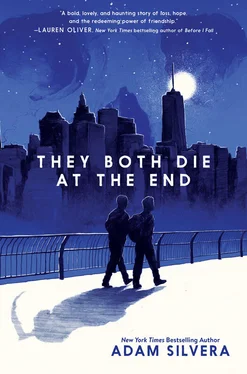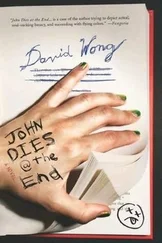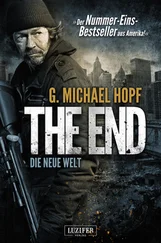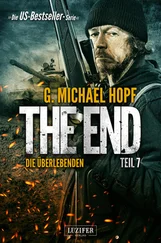Delilah jumps out of bed, her heart pounding.
She isn’t waiting around for this developing story.
Delilah will be the writer who reports the story.
5:20 a.m.
I approach the ATM on the corner while Rufus watches my back. My dad thankfully had the common sense to send me to the bank after I turned eighteen so I could get a debit card. I withdraw four hundred dollars, the max limit at this ATM. My heart is pounding as I slide the cash into an envelope for Lidia, praying someone doesn’t come out of nowhere and hold us up at gunpoint for the money—we know how that would end. I grab the receipt, memorizing how I have $2,076.27 left in my account as I tear up the slip. I don’t need that much. I can get more cash for Lidia and Penny at another ATM or the bank, when it opens.
“It might be too early to go to Lidia’s,” I say. I fold up the envelope and put it in my pocket. “She’ll know something is up. Maybe we can hang in her lobby?”
“Nah, dude. We’re not sitting around in your bestie’s lobby because you don’t wanna burden her. It’s five o’clock, let’s eat. Potential Last Supper.” Rufus leads the way. “My favorite diner is open twenty-four hours.”
“Sounds good.”
I’ve always been a superfan of mornings. I follow several Facebook pages about mornings in other cities (“Good Morning, San Francisco!”) and countries (“Good Morning, India!”), and no matter the time of day, in my feed there are pictures of glowing buildings, breakfast, and people beginning their lives. There’s newness that comes with the rising sun, and even though there’s a chance I won’t reach daytime or see sun rays filtering through trees in the park, I should look at today as one long morning. I have to wake up, I have to start my day.
The streets are really clear this early. I’m not anti-people, I just don’t have the courage to sing in front of anyone. If I were alone right now, I’d probably play some depressing song and sing along. Dad taught me it’s okay to give in to your emotions, but you should fight your way out of the bad ones, too. The days after his admittance, I was playing positive and soulful songs, like Billy Joel’s “Just the Way You Are,” so I wouldn’t feel hopeless.
We reach Cannon Café. There’s a triangular sign above the door with an illustrated logo of a cannon blasting a cheeseburger toward the café’s name, with French fries exploding wayward like fireworks. Rufus chains his bike to a parking meter and I follow him inside the fairly empty café, immediately smelling scrambled eggs and French toast.
A tired-eyed host greets us, telling us we can sit wherever. Rufus passes me and goes all the way to the back, settling into a two-person booth beside the bathroom. The navy-blue leather seats are cracked in various places, and it reminds me of the couch I had as a kid where I would absentmindedly peel the fabric off until there was so much exposed cushion foam that Dad threw the couch out for our current one.
“This is my spot,” Rufus says. “I come here once or twice a week. I get to say stuff like ‘I’ll have the usual.’”
“Why here? Is this your neighborhood?” I realize I have no idea where my Last Friend actually lives, or where he’s from.
“Only for the past four months,” Rufus says. “I ended up in foster care.”
Not only do I not know much about Rufus, I haven’t done anything for him. He’s been all about the mission of shadowing me on my journey—getting me out of my home, going to and getting me out of the hospital, and soon coming with me to Lidia’s. This Last Friendship has been very one-sided so far.
Rufus slides the menu my way. “There’s a Decker discount on the back. Everything is free, if you can actually believe that.”
This is a first. In all the CountDowners feeds I’ve read, the Deckers go to five-star restaurants expecting to be treated like kings with courtesy meals, but are only ever offered discounts. I like that Rufus returned here.
A waitress comes out from the back and greets us. Her blond hair is pulled back into a tight bun, and the button clipped to her yellow tie reads “Rae.” “Good morning,” she greets us, in a southern accent. She grabs the pen out from behind her ear, and I glimpse a curly tattoo above her elbow—I’ll never grow into someone unafraid of needles. She twirls the pen between her fingers. “Late night for you two?”
“You could say that,” Rufus answers.
“Feels more like a really early morning,” I counter.
If Rae is actually interested in my distinction, she doesn’t show it. “What can I get you two?”
Rufus looks at the menu.
“Don’t you have a usual?” I ask him.
“Changing it up today. Last chance and all that.” He puts the menu down and looks up at Rae. “What do you suggest?”
“What, did you get the alert or something?” Her laughter is short-lived. She turns to me and I lower my head until she crouches beside us. “No way.” She drops her pen and notepad onto the table. “Are you boys okay? Sick? You’re not pranking me for a free meal, are you?”
Rufus shakes his head. “Nah, not kidding. I come here a lot and wanted to roll through one last time.”
“Are you seriously thinking about food right now?”
Rufus leans over and reads her pin. “Rae. What should I try?”
Rae hides behind her hand, shakes her shoulders, and mutters, “I don’t know. Don’t you just want the Everything Special? It has fries, sliders, eggs, sirloin, pasta . . . I mean, it has everything you could want that we have in the kitchen.”
“No way I’m gonna eat all that. What’s your favorite meal here?” Rufus asks. “Please don’t say fish.”
“I like the grilled chicken salad, but that’s because I eat like a bird.”
“I’ll have that,” Rufus decides. He looks at me. “What do you want, Mateo?”
I don’t even bother looking at the menu. “I’ll have whatever your usual is.” Like him, I’m hoping it’s not fish.
“You don’t even know what it is.”
“As long as it’s not chicken tenders it’ll be something new for me.”
Rufus nods. He points to a couple items on the menu and Rae tells us she’ll return shortly, then rushes away so quickly she leaves behind her pen and notepad. We overhear Rae telling the chef to make our order priority number one because “there are Deckers at the table.” Not sure who our competition is—the guy in the back already drinking his coffee while he reads his newspaper? But I do appreciate Rae’s heart, and I wonder if Andrea at Death-Cast was once like her before the job killed her compassion.
“Can I ask you something?” I say to Rufus.
“Don’t waste your breath on questions like that. Just come out and say whatever you want,” he says.
He’s coming on a little strong, but good call.
“Why did you tell Rae we’re dying? Doesn’t that screw with her day?”
“I guess. But dying is screwing with my day and there isn’t anything I can do about it,” Rufus says.
“I’m not telling Lidia I’m dying,” I say.
“That makes no sense. Don’t be a monster. You have a chance to say goodbye, you should do it.”
“I don’t want to ruin Lidia’s day. She’s a single mom and she’s already had a rough time since her boyfriend died.” Maybe I’m not actually so selfless—maybe not telling her is really selfish, but I can’t bring myself to do it, because how do you tell your best friend you won’t be around tomorrow? How do you convince her to let you leave so you have a chance of living before you die?
I push back against my seat, pretty disgusted with myself.
“If that’s your call, I back it. I don’t know if she’ll resent you or not, you know her best. But look, we gotta stop caring about how others will react to our deaths and stop second-guessing ourselves.”
Читать дальше












